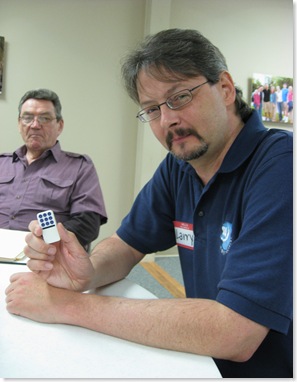Can't seem to find the time to write? Is a busy daily schedule keeping your fingers off the keyboard, or a pen from your hand? "Carving out the time to write can be easy and fun," says Leech, now a full-time writer after 23 years as a journalist.
Larry began his speech by asking each of us to jot down our top two favorite writing topics on separate sheets of paper. He collected our #2 priority and tore those up and then he asked us to crumple up our #1 priority. An idea isn't worth any more than that crumpled paper, he suggests, unless we're working on it or writing about it. Nearly all the ideas we had today will be lost if we didn't take the time to record them.
If we don't free up some time in our calendar to write, then we probably won't get around to writing. "A one hour TV show can eat up about two hours of writing time," says Leech. First you start anticipating that you want to watch the show. You might get a drink and a snack before you sit down to watch TV and get distracted with several other activities in the process. After the show is over it could take you a half hour to get yourself in the frame of mind to write.
Track Your Time For Two Weeks
Larry recommends tracking how you spend your time for two weeks. Note all the major activities that you're doing in either 15 or 30 minute increments. You need to do this every day throughout the day because you won't remember precisely what you were doing several hours after the time has passed.
"Most people neglect their health, their sleep and/or their relationships when they're trying to find more time in the day." Over time, any one of these can negatively influence your health or your relationships. At the end of the two weeks, analyze how you're spending your time and decide where and how you can make more time to write. You may be surprised at how much time you can find in your days if you eliminate lower priority activities.
Everyone Gets 168 Hours A Week
Everyone has 168 hours a week to use or lose. "If God is calling you to write and you aren't, then you're filling your schedule with things that don't belong there," says Leech. "Only you can decide what changes you need to make." Be creative. Larry told the story of a mom who taught her young children that she needed ten minutes of quiet time every hour, without any distractions. By writing ten minutes every hour, day after day, she eventually became a published author.
When you're writing, be sure to limit your distractions. Shut down your e-mail and the internet. Turn off your cell phone. Let others know that you are unavailable for ten minutes, thirty minutes, one hour or two hours. Only you can decide what will work best for you. Larry listens to rock music when he's writing a fast scene and slow music when he's working on a piece that's more serene.

Larry Leech with Domino showing all or nothing.
All or Nothing
Larry closed his speech by telling a story about going to a seminar where he was asked to select one domino among many. As the dominos were being passed around, he decided that he wanted to find one with nine dots on one side and none on the other. When the box came to him, he found one very quickly. Since then, this domino has reminded Larry that if he decides to do something, he's going to give it his all or he's not going to do it at all.
Larry Leech is a full-time freelance writer and the current president of Word Weavers, a Christian writing critique group in Orlando, Florida, with about 70 members.
Total Attendees at today's meeting: 6
New members joining today: Lavada Haupt
Total current members: 11





